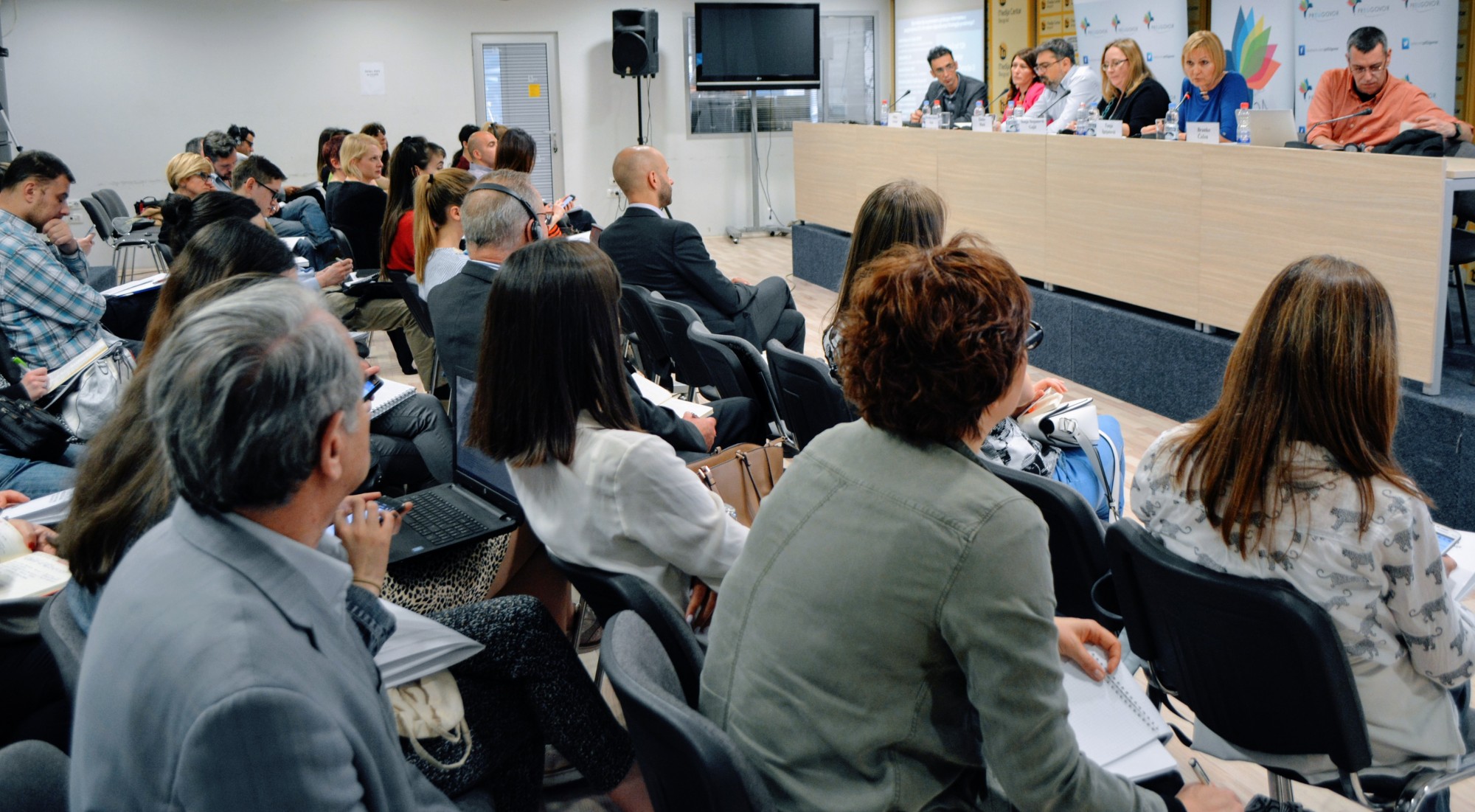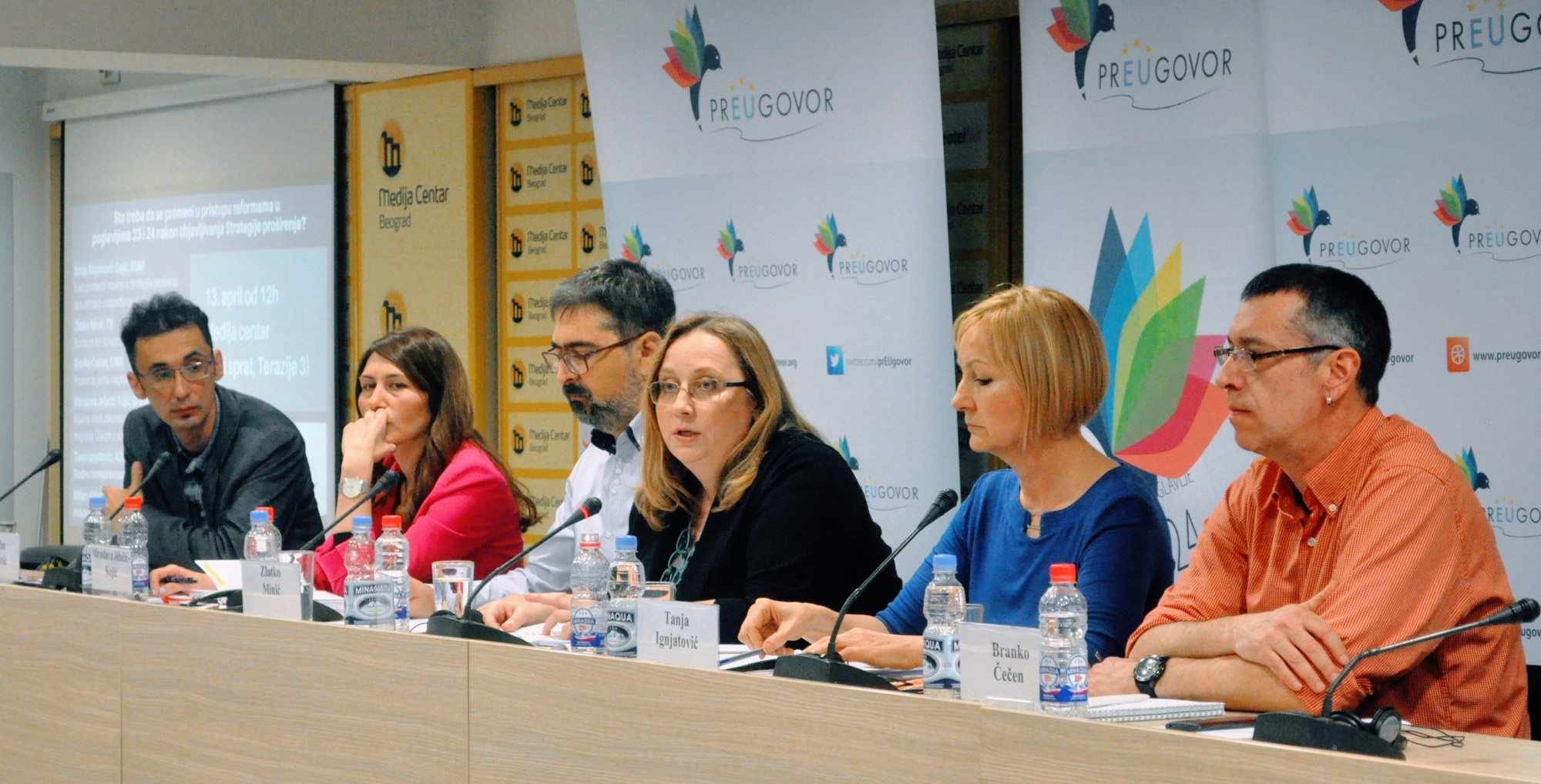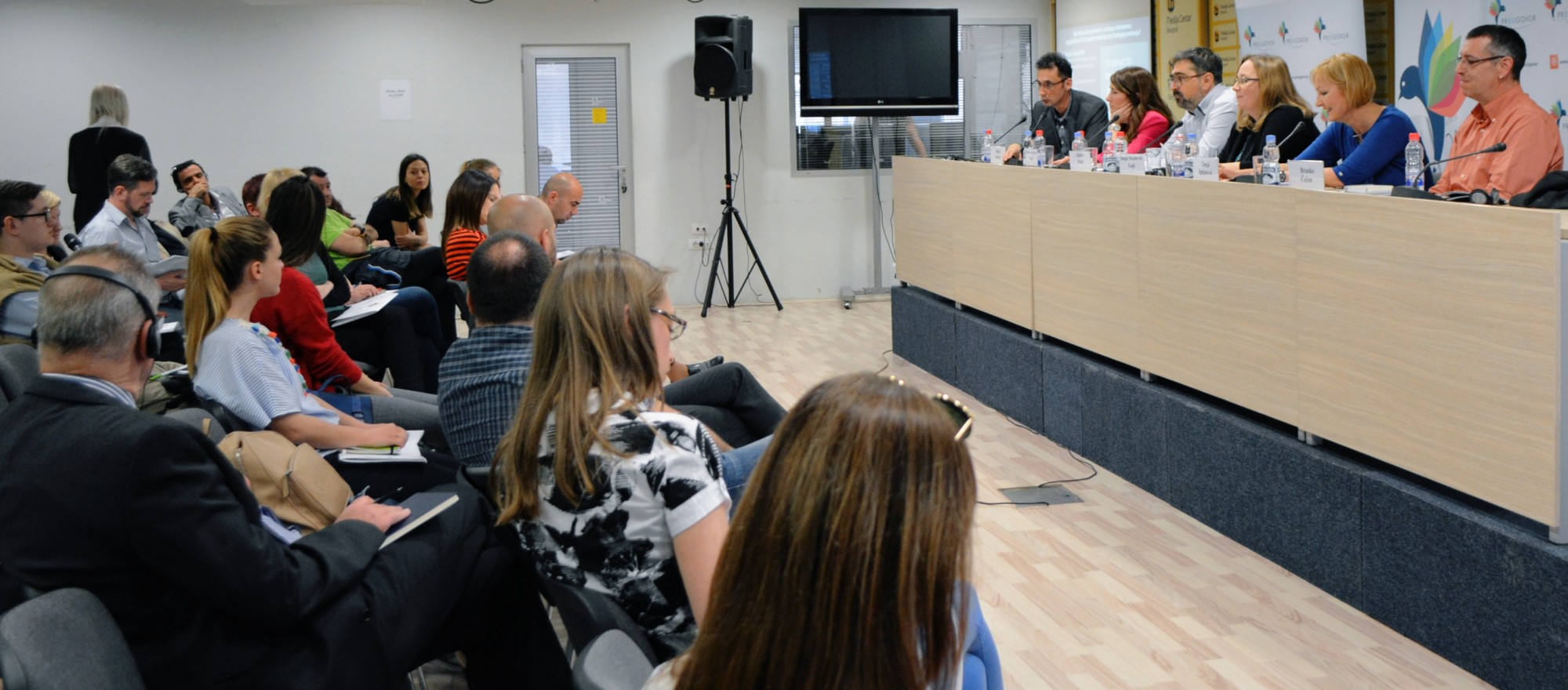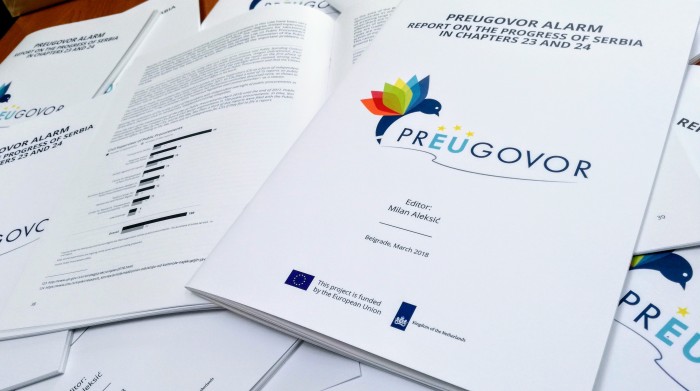The implementation of the Action Plans has to be accelerated and the focus shifted from the form to the substance in order for Serbia to fulfill all its obligations and become a member of the European Union by 2025, it was pointed out at the presentation of the coalition prEUgovor six-month report on April 13, 2018 in Media Center in Belgrade. It was concluded that the state should change the approach to reforms in chapters 23 and 24 relating to the Judiciary and fundamental rights and Justice, freedom and security, since no significant progress has been achieved so far, and the situation in some areas is worsened.
The EU Recognizes the Problem of State Capture
Sonja Stojanović Gajić from the Belgrade Center for Security Policy (BCSP) pointed out three changes in the accession negotiations: the clear intention of the EU that it wants Western Balkans "in its backyard," the need to strengthen the cooperation of Serbia's security institutions with the EU, and recognizing the state capture as an essential problem.
Through the recent Enlargement Strategy for the Western Balkans, the European Union for the first time explicitly pointed to the problem of state capture, describing the situation in which informal groups and individuals abuse the channels of government to extract public resources for private purposes, explained Stojanović Gajić. However, the EU has failed to address this diagnosis with the solutions needed to prevent it. Stojanović Gajić pointed to the example of good practice in Macedonia, where the report by EU Special Envoy Priebe showed that the institutions were captured in favor of a small group. The significance of this report is that it draws attention to the core of governance and the quality of democracy rather than a percentage of law compliance. The Enlargement Strategy allows for such reports to be done in other countries, and the coalition prEUgovor urges it to be a priority for implementation of the Strategy.
Stojanović Gajić warned that the future revision of the Action Plans should not be understood only as a shift in deadlines and setting new activities, but a discussion should be opened on how to resolve essential problems in the field of the rule of law. The EU should also focus on the situation in practice and in the new European Commission Report on Serbia needs to demonstrate a changed approach. In addition to the date of the accession, further democratization of society is of key importance, which is coalition prEUgovor’s mission, concluded Stojanović Gajić.
Stojanović Gajić pointed to Amendments to the Law on Free Access to Information of Public Importance that would reverse the level of protection of rights guaranteed by the existing law.
"Among other things, proposed changes stipulate that publicly owned companies that have changed their status, and which have large public natural resources, are exempt from requests for free access to information. This can be detrimental to preventing potential corruption, and also cause the lack of timely identification of management errors," said Stojanović Gajić.
Investigative Journalism Endangered by Law Changes
Branko Čečen from the Center for Investigative Journalism of Serbia (CINS) agreed that the proposed amendments to the Law on Free Access to Information of Public Importance will disable the work of investigative journalists, as the deadline for obtaining the requested document can be extended to 2 years. CINS sends around 2000 requests for access to information to the national authorities annually, which are necessary sources for a reliable story.
"Nothing will remain of investigative journalism in Serbia if the proposed amendments to the Law on Free Access to Information are adopted," Čečen warned. The poor state of the media and the announced amendments to the Law are not good examples of changes in a country that should be a full member of the EU in 2025.
Čečen illustrated the phenomenon of state capture with the case of excessive control of media outlets, among which Južne vesti are currently under attack. These inspections are also reflected in the European Commission Report for 2017. Despite this report, Čečen emphasized, media financing is still dramatically dropping.
No Progress in the Human Rights Sector
Tanja Ignjatović from the Autonomous Women's Center (AWC) emphasized that everything related to gender equality is stalled and drew attention to the unconstitutional statements made by the President while talking about natality measures.
"Particularly concerning are the mandatory procedures related to abortion, which will involve counseling with priests and psychologists, which will result in medical 'conscientious objection', and then a reduction in the number of safe places to perform abortion. That will directly endanger the health of women," said Ignjatović.
"Announcements of abortion measures are completely contrary to the Constitution, family values, and international standards. Essentially, these are measures against women," Ignjatović warned.
On the example of the national SOS helpline for women victims of violence, for which the license was given only the organization whose representative was on the ruling party’s list in Belgrade elections, Ignjatović underlined that the big problem with social protection is that “we can’t control how and to whom funds are allocated.”
(In)Dependent Judiciary?
Zlatko Minić from Transparency Serbia (TS) pointed to cases in the field of justice, where constitutional amendments are discussed in an atmosphere in which representatives of the government insult professional associations and reject their feedback. Proposed constitutional changes "do not bring greater independence of the judiciary and the prosecution from the authorities, but open up new channels to influence them," Minić pointed out. He also warned that some reforms on the European path are being done only to fit the broadest criteria, which will bring no substantial change, and can lead to a downward path. As an example Minić said that judges and prosecutors in the Judicial Councils will not have a majority, and that the Judicial Academy will be "the only entry point for new judges and prosecutors."
Necessary Dialogue of All Actors in the Field in the Area of Migration
Miroslava Jelačić Kojić from Group 484 talked about migration policy. She pointed out that progress was made in the field of migration, since after several years the systematic Law on Asylum and Temporary Protection and the Law on Foreigners were adopted in March 2018. In addition to numerous good aspects of the law, the position of Group 484 is that there is plenty of room for improvement, Jelačić Kojić emphasized.
The challenge is to prepare and implement the bylaw acts necessary for the implementation of new regulations. More important is the building of institutional capacities and capacities of CSOs working in the field due to a number of changes, especially in the treatment of migrants who are illegally staying in the territory of Serbia, Jelačić Kojić highlighted.
In the coming period it is crucial that all interested actors active in the field, institutions and civil society organizations, achieve constructive dialogue. Jelačić Kojić sees this kind of dialogue as an important first step towards reaching a solution in institutional issues, as well as issues of coordination and strategic framework, which will contribute to better implementation of adopted regulations.
The event is a part of project "prEUgovor Policy Watch: Monitoring Reforms in Chapters 23 and 24", funded by the European Union. This conference is supported by the Embassy of the Kingdom of the Netherlands, within the MATRA program.
About prEUgovor
Coalition prEUgovor is a network of civil society organisations formed in order to monitor the implementation of policies relating to the accession negotiations between Serbia and the EU, with an emphasis on Chapters 23 and 24 of the Acquis. In doing so, the coalition aims to use the EU integration process to help accomplish substantial progress in the further democratisation of the Serbian society.
Members of the prEUgovor are: ASTRA - Anti Trafficking Action, Autonomous Women’s Center (AWC), Belgrade Centre for Security Policy (BCSP), Center for Investigative Journalism of Serbia (CINS), Center for Applied European Studies (CPES), Group 484 and Transparency Serbia (TS).
Follow prEUgovor activities on the official website, Facebook page and Twitter account.






